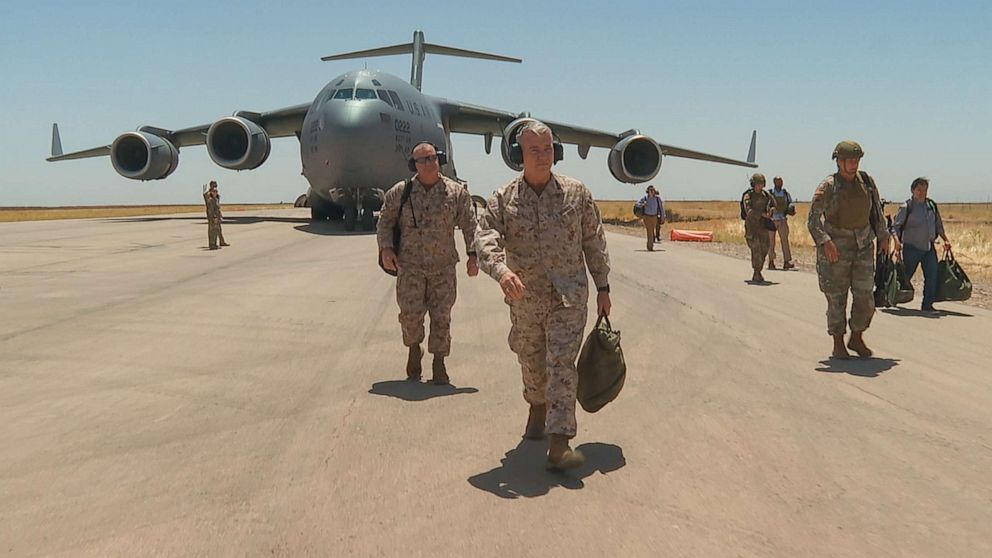Repatriating refugees at Syrian camp could stem ISIS resurgence: US general
EASTERN SYRIA -- The top U.S. military commander in the Middle East is optimistic that next week's planned repatriation of a hundred Iraqi families from a large refugee camp in Syria could be the first step toward reducing the threat of a resurgence of the Islamic State emanating from the camp that is home to 65,000 mostly women and children, including many ISIS supporters.
Gen. Frank McKenzie, the commander of U.S. Central Command, made his comments to ABC News and Associated Press reporters accompanying him during his visit Friday to several U.S. bases in northeastern Syria.
The U.S. still has about 900 American troops inside Syria who are assisting Syrian Kurdish forces in their fight against the remnants of ISIS.
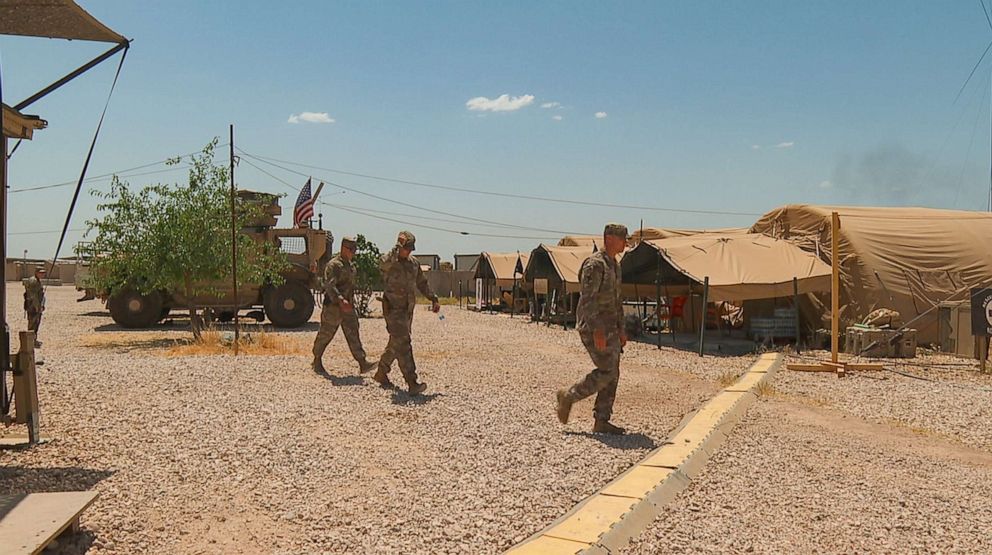
McKenzie was optimistic that the repatriation would actually take place next week, as is currently planned, and would serve as "the first step in many such repatriations" from the camp at al-Hawl in central Syria.
"I think that's going be the key to bringing down the population at at the al-Hawl camp and indeed other camps across the region," he added. "Nations need to bring back their citizens, reintegrate them, de-radicalize them if necessary and make them productive elements of society."
The sprawling detention camp has become a hub of Islamic State operations and become notorious as a place where ISIS supporters enforce their militant ideology on camp residents.
"What concerns me is the ability of ISIS to reach out to these young people in a way that unless we can find a way to take it back, it's gonna make us pay a steep price down the road," said McKenzie.
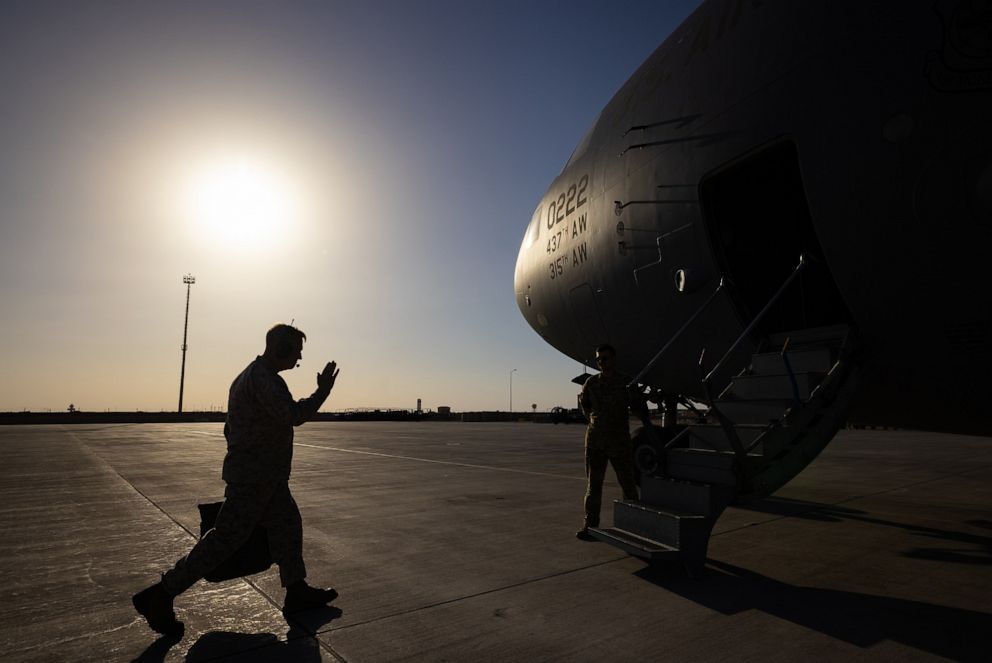
In a separate interview with ABC News, McKenzie described the targeting of young children at the camp as "a long-term threat."
"They're being radicalized every day by ISIS even as they provide basic services to keep the camp running," he said. "It's very hard to break that cycle" that in a decade could potentially see them become ISIS fighters.
McKenzie sees the repatriation of families to their home countries as a solution to that nightmare scenario, though he feels that process is moving too slowly.
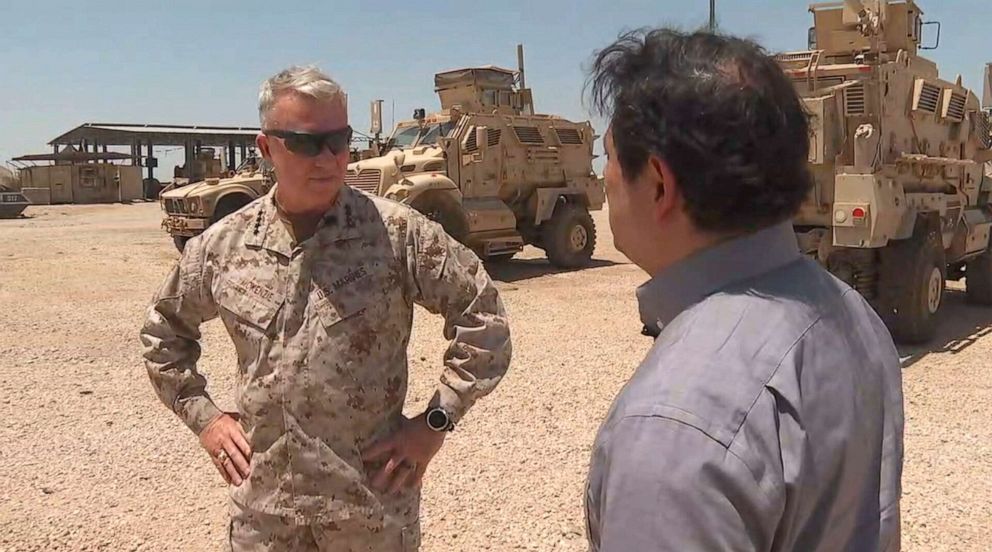
"Bring them home," said McKenzie. "That's what needs to happen and our State Department's aggressively working to that goal right now. Indeed, the entire international community is, but the pace is too slow right now."
But McKenzie's short term focus in Syria is keeping the pressure on the remaining ISIS fighters in that country, the main reason why U.S. troops are still in that country.
Though defeated on the battlefield and no longer holding any territory in Syria and Iraq, the U.S. and its partners in the anti-ISIS coalition remain concerned that ISIS is determined to reform as a viable fighting force.
"They're attempting to reconstitute themselves; they're attempting to come back," said British Brig. Gen. Richard Bell, who serves as the deputy commanding general of Operation Inherent Resolve.
But Bell added that the combined efforts of the coalition, Iraqi security forces and Kurdish forces in Syria and Iraq have "effectively dismantled them as a large-scale terrorist organization."
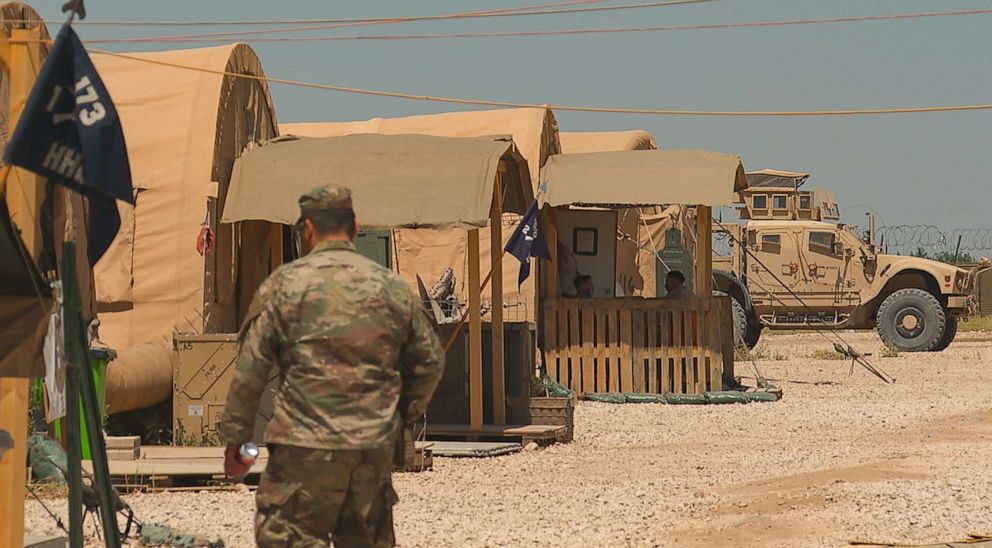
But they "haven't gone away," said Bell, which is why he explained that coalition forces are still needed in Syria.
"Until the last remnants are completely defeated and the will is also broken to stop and try to come back then I think there will be a requirement to assist our partner forces," he said.
As a demonstration of the coalition's commitment to those Kurdish partners, McKenzie met Friday with Gen. Mazloun Abdi, the senior commander of the Kurdish-led Syrian Democratic Forces, who are continuing the fight against the remnants of ISIS.
A large number of the U.S. troops in Syria right now are Louisiana National Guardsmen from that state's 256th Brigade Combat Team who already had a busy year stateside before their overseas deployment.
Last spring, 500 of the brigade's soldiers helped establish mobile COVID-19 testing sites in Louisiana while other members of the unit then helped build a 2,000-bed hospital to treat COVID patients. The brigade then helped assist with the response to six hurricanes before preparing for their deployment to Syria and Iraq.
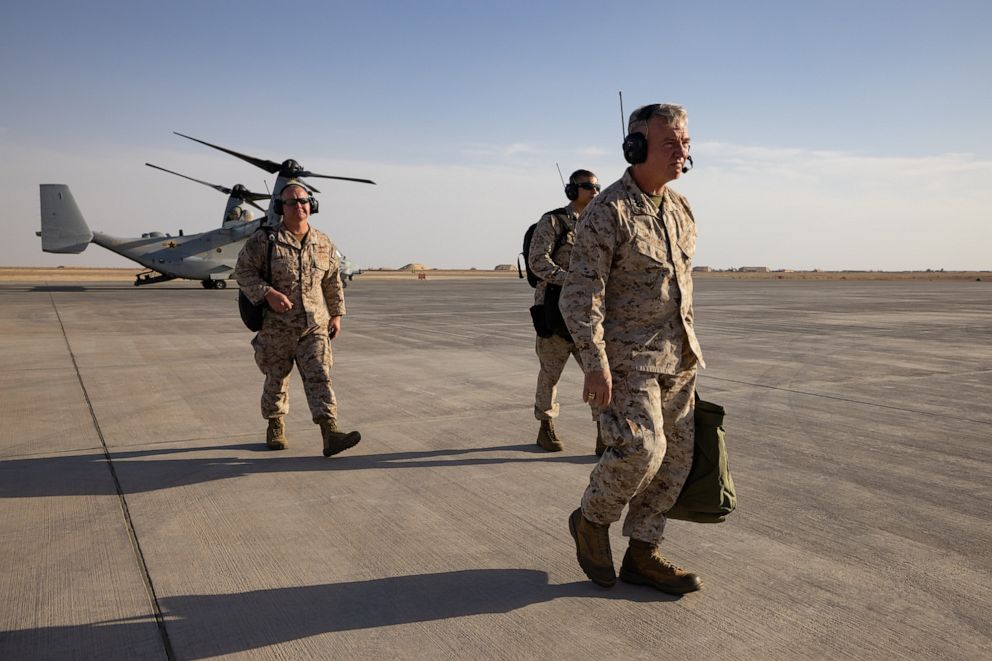
In Syria, Col. Scott Desormeaux, the commander of the 256th Brigade, said his forces provide support to the special operations forces working with the Kurds. "We''re all a part of allowing the SDF to continue to fight," said Desormeaux.
But the landscape in eastern Syria is a complex one where American forces also interact with Russian forces supporting the Assad regime who have moved eastward toward the Euphrates River area where U.S. forces operate.
An incident last year where Russian forces brazenly harassed American troops on a patrol led McKenzie to order the deployment of armored Bradley Fighting Vehicles to Syria.
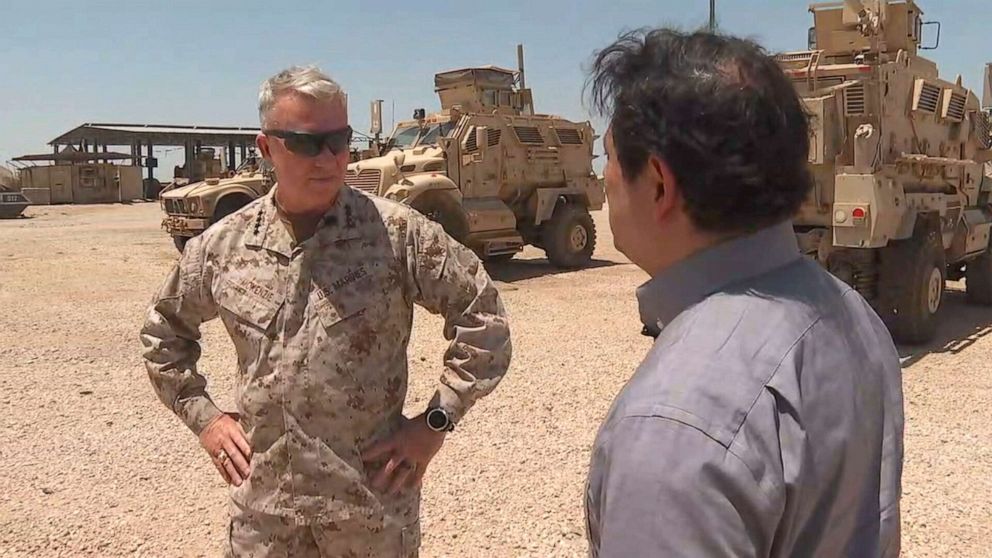
After seeing some of those vehicles on Friday, McKenzie told ABC News that their deployment sent the message that "this is not the time to mess around with the Americans in the region."
Desormeux said that since the arrival of his forces the interactions his forces have had with Russian patrols have been professional.
In a further attempt to de-escalate tensions, his unit incorporated Russian linguists to avoid miscommunication "so that nothing gets lost in translation."
On Thursday, McKenzie visited Iraq where he met with Iraqi Prime Minister Mustafa al-Kadhimi to discuss the future of the 2,500 American troops in that country.
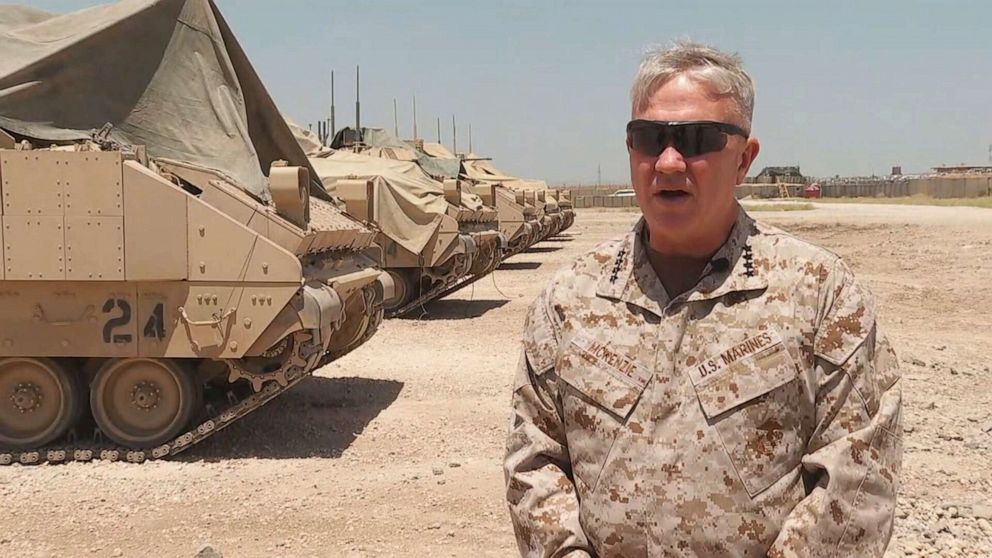
As in Syria, American troops are providing assistance to the Iraqi military as it stamps out the remnants of the Islamic State.
Kadhimi's government is in talks with the United States about the long-term presence of American troops in the country, an effort that has drawn the ire of Iranian-backed Shiite militia groups. The U.S. has blamed some of those groups for rocket attacks on U.S. facilities in Iraq, an apparent attempt to escalate tensions and force a U.S. withdrawal.
Parliamentary elections scheduled for October may result in another Shiite-led government, but a senior U.S. official said it is not automatic that a new Shiite government would let itself be influenced by Iran.
The official expressed optimism that a new wave of Iraqi Shiite politicians that are more nationalistic and wary of Iranian influence on Iraqi politics may come to power and will continue advocating for a long-term U.S. military presence in Iraq.
